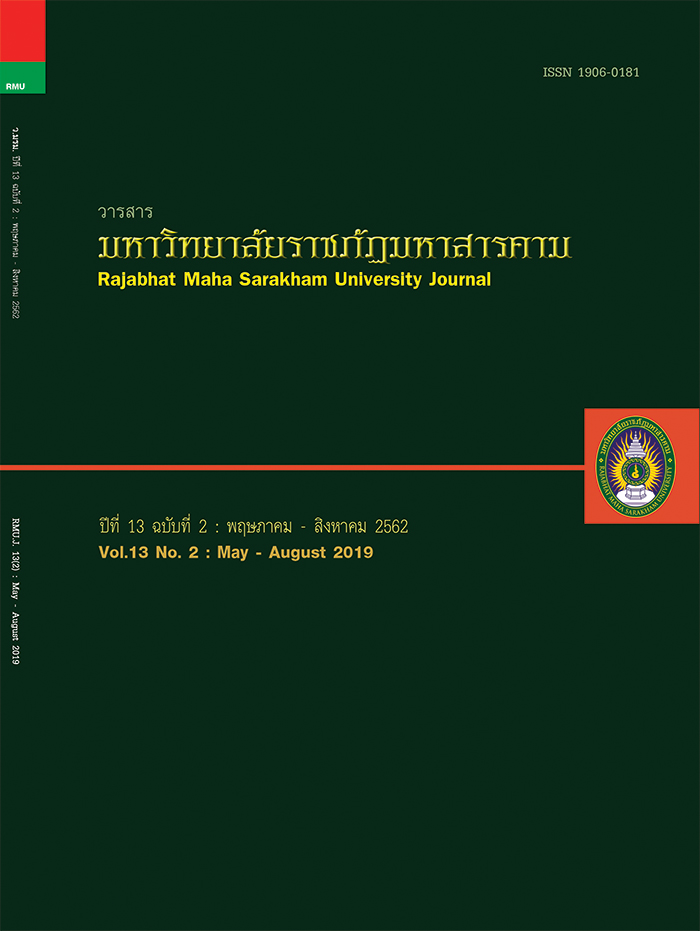การประเมินหลักสูตรปรัชญาดุษฎีบัณฑิตสาขาวิจัยและประเมินผลการศึกษา มหาวิทยาลัยราชภัฏมหาสารคาม
Main Article Content
บทคัดย่อ
การวิจัยครั้งนี้มีวัตถุประสงค์เพื่อประเมินหลักสูตรปรัชญาดุษฎีบัณฑิต สาขาวิชาวิจัยและประเมินผลการศึกษา(หลักสูตรปรับปรุง พ.ศ. 2556)โดยใช้รูปแบบการประเมิน CIPPIESTเป็นหลักในการประเมิน กลุ่มผู้ให้ข้อมูล ประกอบด้วยอาจารย์ผู้รับผิดชอบหลักสูตร/อาจารย์ประจำหลักสูตรจำนวน 8 คน นักศึกษาปัจจุบันจำนวน 41 คน ดุษฎีบัณฑิต จำนวน 15 คนและผู้ใช้บัณฑิต จำนวน 14 คนรวมจำนวนทั้งสิ้น78 คน เครื่องมือที่ใช้ในการวิจัยประกอบด้วยแบบสอบถามและแบบสัมภาษณ์แบบมีโครงสร้างการวิเคราะห์ข้อมูลใช้สถิติร้อยละ (%) ค่าเฉลี่ย ( ) ค่าเบี่ยงเบนมาตรฐาน (S.D.) และการวิเคราะห์เนื้อหา (Content Analysis) ผลการวิจัยพบว่า1)ภาพรวมของการประเมิน อาจารย์ผู้รับผิดชอบหลักสูตร อาจารย์ประจำหลักสูตร นักศึกษา ดุษฎีบัณฑิตและผู้ใช้บัณฑิต มีความคิดเห็นว่ามีความเหมาะสมอยู่ในระดับมากที่สุด2)ด้านบริบทมีความเหมาะสมอยู่ในระดับมากที่สุดหลักสูตรควรสอดคล้องกับความต้องการศึกษาของสังคมและทันต่อการเปลี่ยนแปลงทางนวัตกรรมและเทคโนโลยี3)ด้านปัจจัยนำเข้า มีความเหมาะสมอยู่ในระดับมาก ควรมีตำราภาษาอังกฤษที่ทันสมัยและจำนวนเพิ่มขึ้นและมีห้องประชุมเพื่อแลกเปลี่ยนเรียนรู้และสืบค้นสำหรับนักศึกษา4)ด้านกระบวนการ มีความเหมาะสมอยู่ในระดับมาก ควรปรับพื้นฐานและเสริมความรู้ให้นักศึกษาที่ไม่ได้จบสาขาวิจัยและประเมินผลการศึกษาโดยตรง5)ด้านผลผลิต มีความเหมาะสมอยู่ในระดับมากที่สุดควรนำความรู้ความเข้าใจทางการวิจัยและประเมินผลการศึกษาไปพัฒนาองค์ความรู้และประยุกต์ใช้ในการทำงาน 6) ด้านผลกระทบ มีความเหมาะสมอยู่ในระดับมากที่สุด ควรเสริมสร้างให้มีความมั่นใจในองค์ความรู้ด้านการวิจัยและประเมินผลการศึกษา การนำความรู้ไปบูรณาการในการทำงานและให้คำปรึกษาแก่บุคคลอื่นได้อย่างมีประสิทธิภาพ 7) ด้านประสิทธิผล มีความเหมาะสมอยู่ในระดับมากที่สุดควรเสริมสร้างให้มีความมั่นใจในองค์ความรู้ บูรณาการในการทำงานและให้คำปรึกษาแก่บุคคลอื่นได้อย่างมีประสิทธิภาพ 8) ด้านความยั่งยืนมีความเหมาะสมอยู่ในระดับมากที่สุด มีความรักและศรัทธาในวิชาชีพ มีความมั่นใจในตัวเองและสามารถเป็นที่ปรึกษาให้กับบุคคลอื่นได้อย่างภาคภูมิใจ 9) ด้านถ่ายทอดส่งต่อมีความเหมาะสมอยู่ในระดับมากที่สุด ควรมีการประชาสัมพันธ์หลักสูตรให้ผู้ที่มีส่วนเกี่ยวข้องรับรู้ มีความหลากหลายและครอบคลุม
Article Details
1. บทความที่ลงตีพิมพ์ทุกเรื่องได้รับการตรวจทางวิชาการโดยผู้ประเมินอิสระ ผู้ทรงคุณวุฒิ (Peer Review) สาขาที่เกี่ยวข้อง อย่างน้อย 3 ท่าน ในรูปแบบ Double blind review
2. ข้อคิดเห็นใด ๆ ของบทความที่ลงตีพิมพ์ในวารสารมหาวิทยาลัยราชภัฏมหาสารคาม นี้เป็นของผู้เขียน คณะผู้จัดทำวารสารไม่จำเป็นต้องเห็นด้วย
3. กองบรรณาธิการวารสารมหาวิทยาลัยราชภัฏมหาสารคาม ไม่สงวนสิทธิ์การคัดลอกแต่ให้อ้างอิงแสดงที่มา
เอกสารอ้างอิง
Office of the Higher Education Commission,Ministry of Education. (2008). Higher education plan framework,15 years long term,No. 2 (2008-2022).Bangkok : Printing of Chulalongkorn University.
Ministry of Education.(1999). Act National Education, 1999. Bangkok : KurusapaPrinting.
Faculty of Education, RajabhatMahaSarakham University.(2013). Doctor of Philosophy Program, Department of Educational Research and Evaluation (Course Update,2013). Maha Sarakham : MahaSarakham Rajabhat UniversityPublishing House.
Office of the Education Council, Ministry of Education.(2005). The national educational standards. Bang
Mariam Ninpun. (2011). Doctor of Philosophy Program AssessmentIn Curriculum and Instruction (Course Improvement, 2013). Faculty of Education, Silpakorn University.
Stufflebeam and Shinkfield. (2007). Evaluation Theory, Models and Applications. John Wiley and Son, Ine.
Boonchom Sri Sa-at.(2013). Preliminary research.(9th Edition), Bangkok : Suviriyasarn.
Chavalit Chu Kampaeng. (2016). Curriculum and research development Concepts and processe.(1th Edition). Bangkok : Printing of Chulalongkorn University.
Saman Ekapim. (2017). Curriculum development :theory to practice design and development.(1th Edition). MahaSarakham : Printing ofTukkasira.
Oliva, Peter F. (2009). Development the Curriculum.3rd ed. New York : Harper Collins.
MahshidAbdi Shahshahaniet.,al. (2015).The Evaluation of Reproductive Health PhD Program in Iran : A CIPP Model Approach. Procedia-Social and Behavioral Sciences, 197(25).Academic World Education and Research Center.
Prayong Huttaprom. (2011). Course process. (1st edition). Mahasarakham : Rajabhat Maha Sarakham University Press
Maream Nillapun.(2012). The Curriculum Evaluation on Doctor of Philosophy Program in Curriculum and Instruction, Faculty of Education Silpakorn University.
Rattanasiri Khemarat. (2015). The Evaluation of Master of Education Program in Teaching English as a Global Language. Faculty of Educational.Burapha University.
Chaiwat Sutthirat.(2013). Curriculum Development : Theory into practice.V-Print Company Limited. Bangkok.
Taba, Hilda. (1962). Curriculum Development : Theory and Practice. Har-court Brace and World,New York.
Kornphatsorn Indaramrung. (2015). The evaluation of bachelor of education program in Early Childhood Education, Faculty of Education, Veridian E-Journal, Silpakorn University.Silpakorn University
Azadeh Rooholaminiet.,al. (2017). Program evaluation of an Integrated Basic Science Medical Curriculum in Shiraz Medical School, Using CIPP Evaluation Model. Journal of Advances in Medical Education & Professionalism, 6(4)
Boonliang Toomthong. (2014). Curriculum Development. Surin Rajabhat University Press.
Rattana Buosonte. (2013). CIPP and CIPPIEST Evaluation Models : Mistaken and Precise Concepts of Applications. Veridian E-Journal, Silpakorn University.Silpakorn University
Porntip Chaisoet.,al.(2016). Curriculum Evaluation and Development of Doctor of Education Program in Educational Research and development : Faculty of Educational,KasetsartUniversity. Dusit Thani College Journal.
Jati Aurum Asfaroha, Dadan Rosanaa and Supahara. (2017). International Journal of Environmental & Science Education. Yogyakarta State University, Indonesia
Sunee Phupun. (2003). Basic concepts of curriculum development and Creation. Chiang Mai : The Knowledge Center.
Chanakan Harkhanet.,al. (2015). Evaluation of the Basic Education Core Curriculum B.E. 2551 of the schools under local administration in Prachuap kirikhan Province. The 6th International Conference of suan Sunandha Rajaphat University.


